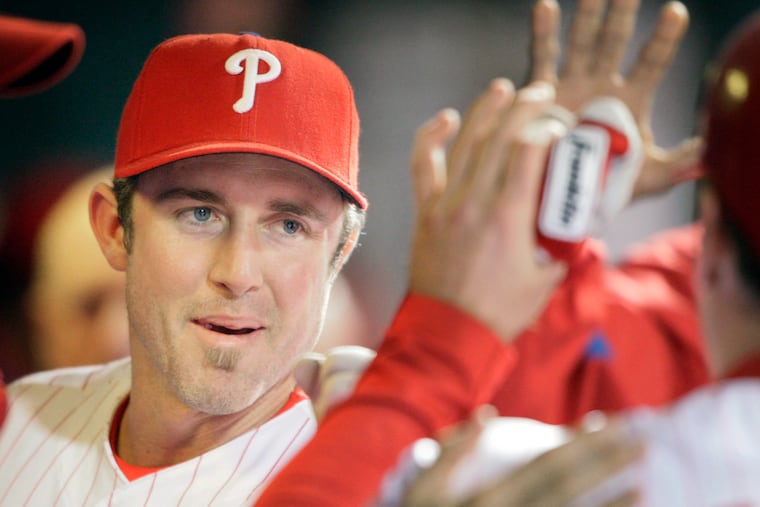Chase Utley’s retirement announcement prompts the question: Is he a Hall of Famer?
Phillies icon Chase Utley's announcement that he will retire at season's end has triggered an early look at his Hall of Fame candidacy.

The eye test, taken by so many of us over the past 16 years, says Chase Utley belongs in the Hall of Fame.
But it isn't that cut and dried.
Utley's announcement Friday that he intends to retire at season's end has prompted the usual conversation whenever a veteran all-star decides to call it quits. It's premature, of course. Not only does Utley have a few more months with the Los Angeles Dodgers to further enhance his legacy, but his name won't even appear on a Hall of Fame ballot until 2023. By then, new writers will have joined the voting body, others will be subtracted. A lot can — and most certainly will — happen between now and Utley's first crack at Cooperstown.
So, the Hall of Fame question need not be answered now. It's worth considering, though, especially as it relates to sorting out Utley's place among the greatest second basemen of all-time.
Aside from being a six-time all-star, Utley led the Phillies to back-to-back World Series appearances and, to paraphrase the man himself, a world bleepin' championship in 2008. He spent 13 seasons in Philadelphia and has the fourth-most Wins Above Replacement in franchise history (61.8), trailing only Mike Schmidt (106.8), Robin Roberts (71.8) and Steve Carlton (69.6), Hall of Famers all.
That makes Utley a Philadelphia icon and a candidate for a future statue outside Citizens Bank Park.
But Utley's impact on the game extends beyond the Delaware Valley. His 65.6 career WAR is 13th among all second basemen, ahead of Jackie Robinson (61.4) and a fraction of a percentage point better than recently minted Hall of Famer Craig Biggio (65.5). He ranks seventh in home runs (259), 11th in on-base plus slugging percentage (.825) and 15th in doubles (409).
For a period of 10 years, from 2005 through 2014, Utley was among the best players in the game. His 59.6 WAR during that span is second to only Albert Pujols (67.6) and leads fellow second basemen Robinson Cano (51.9), Dustin Pedroia (42.9) and Ian Kinsler (40.8). It's somewhat remarkable that Utley never finished in the top-five of the National League MVP voting, but while Phillies teammates Ryan Howard and Jimmy Rollins peaked with MVP seasons, Utley's calling card was his consistency. His OPS dipped below .800 only twice from 2006 through 2013.
Utley never won a Gold Glove either, but he averaged 9.7 defensive runs saved from 2006 through 2014, third-best behind second basemen Brandon Phillips and Pedroia, both four-time winners during that nine-year span. And Utley was always an elite baserunner. Chronic knee problems have slowed him in recent years, but he has swiped 153 bases in 175 tries, an 87.4-percent success rate that ranks second among all players who have attempted at least 50 steals since 2003.
The detractors will point to Utley's hit total. At 1,881 and counting, he would be the first player who retired after 1959 to be elected to the Hall of Fame without collecting at least 2,000 hits. Don't blame Utley for that, though. The Phillies were slow to make him an everyday player. He was 26 years old before they cleared a spot at second base by finally trading Placido Polanco. If they had put Utley in the lineup more often in 2004 (he got only 287 plate appearances despite clocking 13 home runs), he almost certainly would've wound up clearing the 2,000-hit mark.
But Hall of Fame voters can twist the numbers to back up any viewpoint they please. It's always helpful to consult a player's peers before deciding whether to place a checkmark in the box next to their name on the ballot (yes, the Hall still uses paper ballots), and any writer who asks around is likely to hear stories that reflect only admiration for Utley's all-out style of play and savvy leadership. Former Phillies teammate Cole Hamels calls Utley "the ultimate baseball player," which helps explain why the Dodgers have signed an aging star with creaky knees to a one-year contract in each of the past three offseasons.
Legend, propagated by Hall of Fame baseball writer Peter Gammons and widely recognized throughout the game as truth, has it that Utley disguised himself as a batboy and delivered balls to home plate between innings of a game in 2016 to calmly let the umpire know that the Dodgers believed Clayton Kershaw was getting squeezed on borderline strikes.
That's Hall of Fame-worth "teammate behavior," as Phillies manager Gabe Kapler would call it.
Utley was notorious for his focus. With the Phillies, he would dress in full uniform several hours before a game when his teammates were still typically wearing T-shirts to the batting cage. Kapler spent the past few seasons as the Dodgers' director of player development, and whenever he would speak with a young player, he would point to Utley as the example to follow.
"Laser sharp focus, so intense, very quiet, not trying to draw attention to himself, but knew how to prepare for a game," Kapler said. "I think that's part of the reason he was so successful."
Successful enough for the Hall of Fame? The debate will resume in five years.